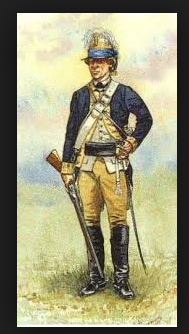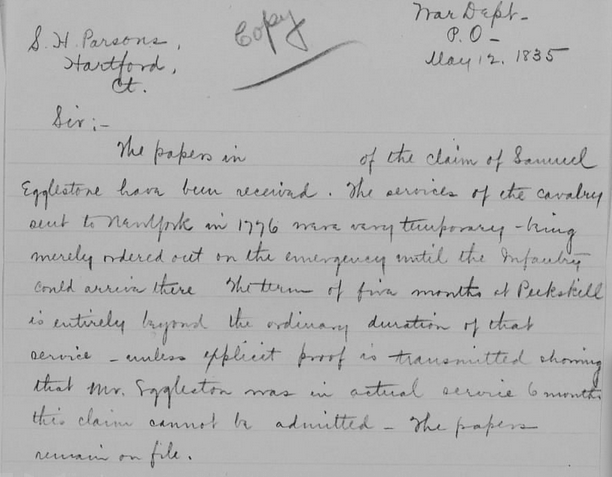You fought in the Revolution?

My paternal 5th Great-Grandfather, Samuel Eggleston, was born on December 9, 1747 in Windsor, Connecticut. Samuel was the son on Nathaniel Eggleston (1702-1792) and Abigail Goodwin (1708-1801) and the husband of Dorcas Loomis ( 1752-1834).
When Samuel was 88 years old, a pension was applied for on his behalf, as provided for by the Pension Benefit Act of 1832. Truth be told, it alleges he did a bit of riding, saw no action and returned home. The application claimed he was a soldier during the American Revolution. The petition states, that he entered the service of the United States as a private in a company of dragoons commanded by Captain Thomas Seymour, Lt. Reuben Ellsworth and Colonel Edward Griswold at Windsor in the County of Hartford in the State of Connecticut. He marched from Hartford, Connecticut to the Peekskill in State of New York and in a few days crossed the Hudson River and proceeded to Hackensack and afterward Newark, then to Elizabethtown, then to New Brunswick and eventually New York. He went with the company many places that the names of which he has entirely forgotten, – and returned in a different route to the Hudson River above Peekskill where they crossed the river where deponent was discharged in a place near Peekskill in the State of New York by General Charles Lee and returned home sometime (he is pretty certain) the later part of December 1776.
After review, the petition was rejected stating that Samuel “failed to furnish satisfactory proof” of his service. There was no record that the decision was contested.

Click here to see Samuel’s complete transcribed pension petition
More about the 1832 Pension Act.
On June 7,
1832, Congress enacted pension legislation extending benefits more universally
than under any previous legislation. This act provided for full pay for life
for all officers and enlisted men who served at least 2 years in the
Continental Line, the state troops or militia, the navy or marines. Men who
served less than 2 years but at least 6 months were granted pensions of less
than full pay. Benefits were payable effective March 4, 1831, without regard to
financial need or disability and widows or children of were entitled to collect
any unpaid benefits due from the last payment to a veteran until his death.
Everyone who claimed benefits under this act were required to relinquish their
claims under any prior federal or state pension laws, but by amendment on
February 19,1833, invalid pensioners were exempted from the operation of this
release of their prior pension benefits. Source